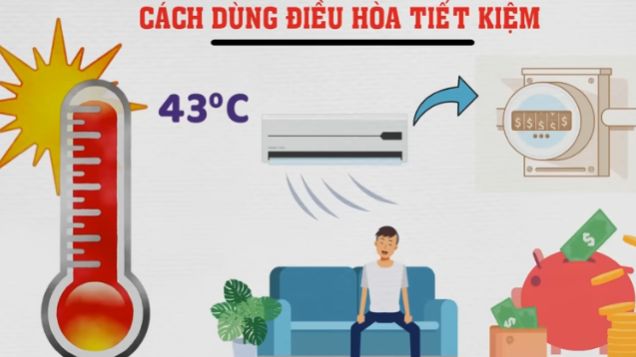Summer is here again and it seems that the weather is getting harsher day by day. Just at the beginning of summer, some places have recorded up to 43°C, so everyone just wants to hide indoors and sit in the air-conditioned room for comfort. But in the air-conditioned room, the body feels comfortable but the head feels troubled when thinking about how to pay the electricity bill at the end of the month. As we all know, the air conditioner is one of the most power-hungry appliances in the house, and in the summer, the air conditioning bill can account for up to 1/3 of the total electricity bill in the house.
How to use the air conditioner most cost-effectively?
First of all, to use the air conditioner efficiently, we must determine what makes the air conditioner consume electricity. The first thing we must mention is the temperature difference. The second is heat dissipation into the environment. The third is the type of air conditioner.
First is "Temperature Difference":
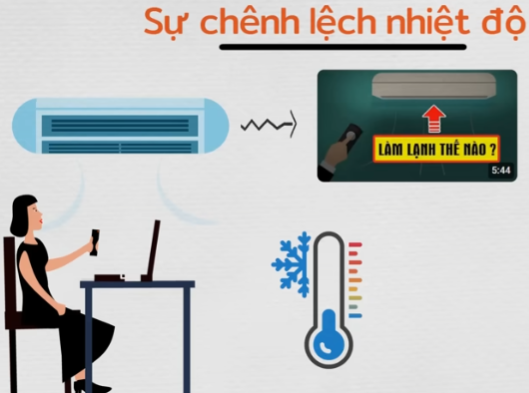
The temperature difference is a very important factor that makes your air conditioner consume less or more electricity. Just imagine that when the air conditioner is running, it blows cold air into the room. In principle, if you do not know how the air conditioner works, you can search for articles on how the air conditioner operates on the internet to learn more. When the air conditioner blows cold air, it will gradually neutralize the hot air in the room and gradually lower the room temperature.
So, the more you want to cool down, the more electricity it will consume. For example, if the room temperature is 30°C and you want to cool it down to 20°C, it will consume much more electricity than if you just cool it down to 25°C. Many people think that once the air conditioner is turned on, it will run the same no matter what temperature is set, so they set it to 18°C to feel comfortable. However, if you set it to 27°C, the air conditioner will run until it reaches 27°C and then stop cooling with a regular air conditioner. With a smarter Inverter air conditioner, it will reduce the cold air production to maintain the temperature at 27°C.
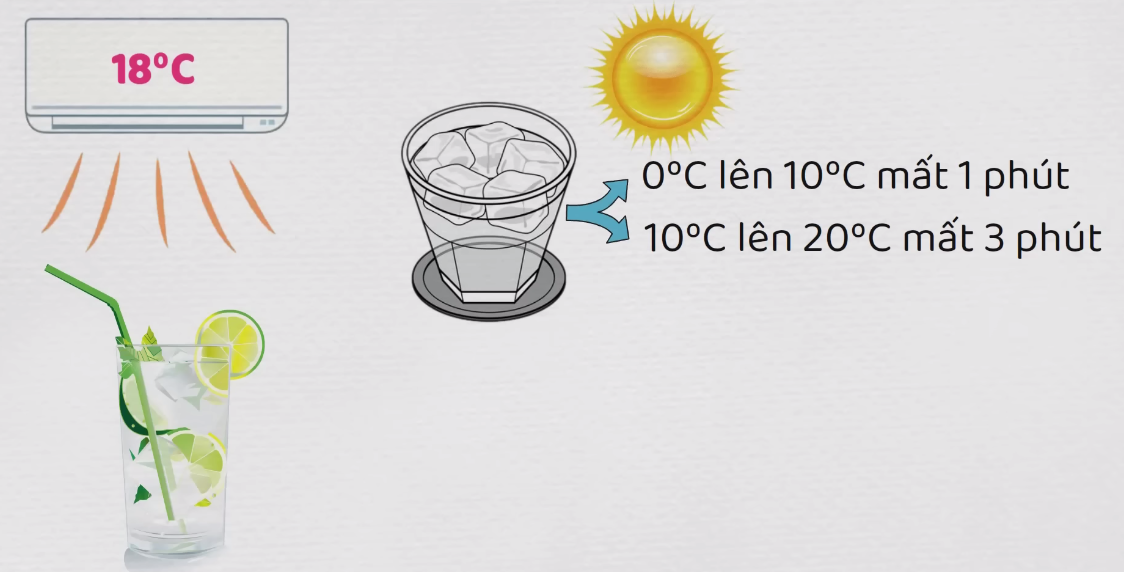
Many people have the misconception that setting the air conditioner to 18°C when starting will cool the room faster. Is that true? The answer is no. Whether you set it to 25°C or 18°C, it will cool at the same speed because the amount of cold air blown out by the air conditioner is fixed, so the cooling speed is the same. Think of it the other way around, if you boil a pot of water to 100°C or 70°C, the boiling speed is the same because the heating power of the pot is the same, the only difference is that when you set it to 70°C, the pot stops when it reaches 70°C, while setting it to 100°C, the pot stops at 100°C. The misconception of setting it to 18°C for faster cooling often makes people unintentionally forget that cooling the room too much unnecessarily can be very costly in terms of electricity. So, if you want to cool it to 27°C, just set it to 27°C without lowering it to 18°C and then adjusting it back to 27°C, because cooling to 18°C can cost up to 5 times more in electricity compared to running the air conditioner at 27°C.
I have measured the electricity consumption when the air conditioner is running at maximum capacity. With an Inverter air conditioner, when it starts and runs at maximum capacity, it consumes 5 times more electricity than when it stabilizes at 27°C and is forced to run down to 18°C, which forces it to run at maximum capacity, resulting in a tremendous electricity consumption. Setting it to 18°C, whether with an Inverter or a regular air conditioner, makes no difference because it always has to run at full capacity, as when it's hot at 40°C, it has to run all day and still cannot reach 18°C.
Another factor that makes setting the air conditioner to a low temperature consume more electricity is "heat exchange with the environment." Imagine that the colder a glass of water is, the faster it loses heat due to the larger temperature difference, the higher the heat exchange rate. For example, if you leave a glass of ice water at 0°C outside in the sun, it will rise to 10°C in just 1 minute, but increasing from 10°C to 20°C will take up to 3 minutes. Looking back at the air conditioner, if you set the air conditioner temperature lower, it will lose heat faster. For example, if the wall temperature is 40°C and you set the air conditioner room temperature to 20°C, there is a 20°C difference, but if you set the room temperature to 25°C, there is only a 15°C difference. The higher the temperature difference, the more heat is lost due to the larger heat exchange with the wall, and the more cold air is lost, the more electricity is consumed. So, setting the temperature lower will consume more electricity because the wall will thank you for cooling it even more. In conclusion, the first thing is to keep the temperature cool enough, not too low, to save electricity.
Second is to reduce unnecessary items in the room.
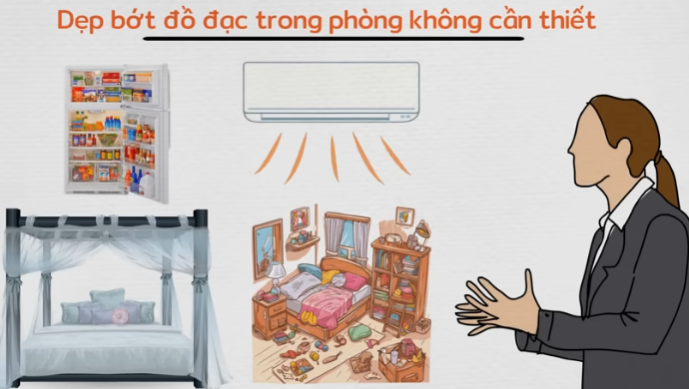
I see many houses with unnecessary items in the bedroom, such as extra blankets and pillows that are only used in winter, then they are stacked in a corner in summer. This also wastes a lot of electricity for the air conditioner because when the air conditioner blows cold air, the entire room will compete to absorb that cold air, the walls will absorb it, the hot air will absorb it, and all the items in the room that are hot will absorb the cold air that the air conditioner blows out, so the more items in the room, the more cold air is absorbed, leading to a long time to cool the room.
Just like putting items in the refrigerator, the fewer items you put in, the faster it cools, but if you fill the refrigerator, it may not cool down in a day. So, if you want to save electricity, keep the room tidy, store unused items in the storage room, or in a room that does not use air conditioning, instead of leaving blankets and pillows on top of the wardrobe and turning on the air conditioner at the end of the month, you will cry over the electricity bill, while the blankets and pillows will be happy to enjoy the cool air. This is something that almost no one pays attention to, but it is extremely electricity-consuming. If you are the only one in the room, then the electricity bill is yours to bear, but if there are 10 more items, they will consume 9 parts of the electricity bill, so stack unnecessary items neatly in the storage room to save electricity.
Third is about air conditioners, there are currently two types of air conditioners: regular and Inverter:
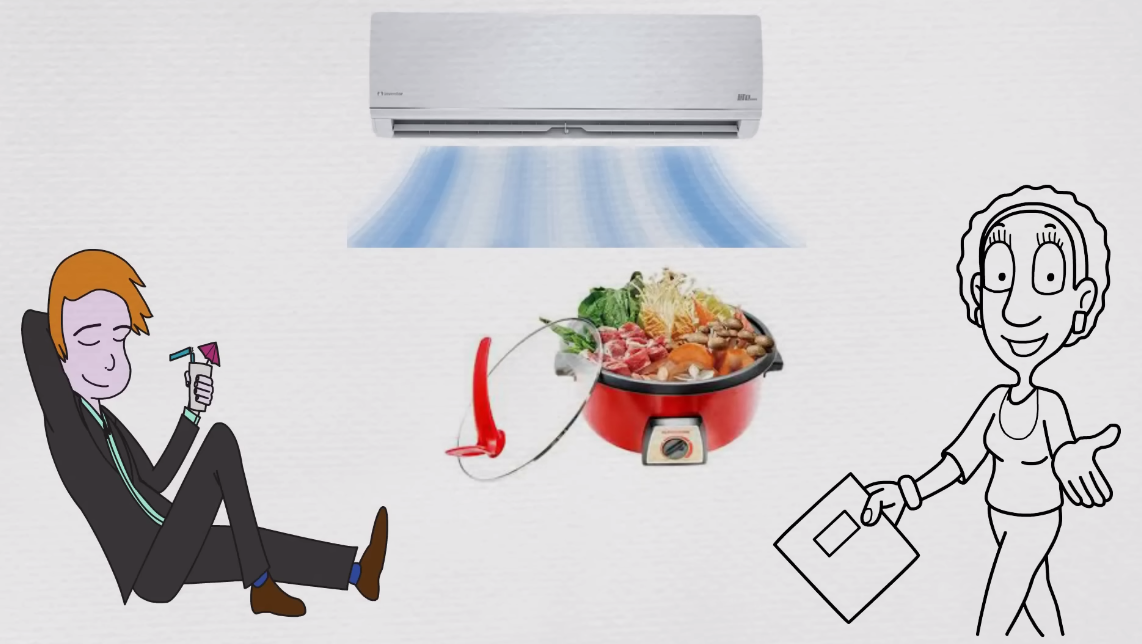
In technical terms, it may be difficult to understand, but I will explain it simply like this. If you set a regular air conditioner to 27°C, it will cool down to 27°C and then stop, waiting for about 10 minutes after the temperature rises to 29°C, it will start again to cool down to 27°C, and when it reaches 27°C, it will stop, repeating this cycle, the regular air conditioner consumes a lot of electricity for the start-stop cycle. Just imagine driving a car, stopping at a red light, then driving a bit, stopping at a red light again, and repeating this, it will consume more fuel.
As for the Inverter air conditioner, it cools down to 27°C as you wish, then it will run smoothly to pump out a sufficient amount of cold air to consume for the room, running smoothly and evenly like that, it will consume less energy while still keeping the room cool. Just like when you eat hotpot, when the pot is boiling, you reduce the power to keep the pot boiling evenly at a light level, so you eat well and save on electricity. Using an Inverter air conditioner that knows how to reduce power consumption is very energy-efficient, sometimes up to 60% compared to a regular air conditioner, but you need to consider the cost. Many families are very economical, only using the air conditioner on the hottest days, so if you are not going to use it for the rest of the days, do not buy an Inverter air conditioner because the electricity saved may not be enough to offset the price difference when buying an air conditioner. Because Inverter air conditioners are usually more expensive by a few million dong.
In addition, by setting the temperature appropriately, you can also use a fan, which is even more economical.
For example, if you set the air conditioner to 25°C, it feels just right, but if you turn on a fan and set it to 27°C, it will feel just as cool. You might think that turning on a fan will consume more electricity, but in reality, you may not realize that the electricity cost for that fan is less than the electricity cost for the air conditioner to maintain the temperature at 25°C compared to 27°C, so setting the appropriate temperature and using a fan is the most economical. Moreover, from my experience, setting the air conditioner too cold can easily cause a sore throat and dry nose when waking up in the morning. Also, experiencing temperature shock due to the high temperature difference with the outside environment is very high. Sleeping with a higher temperature combined with a light fan will make you sleep better, less likely to have respiratory problems, and importantly, when stepping outside, you will not experience temperature shock. Temperature shock can be very dangerous, you may feel fine when stepping outside, but suddenly feel dizzy and faint while riding a motorbike, then hitting another vehicle, it's like the end of our lives.
Therefore, living scientifically is very important, you will be healthy, save money, and cause less harm to the environment, because electricity production also harms the environment, it doesn't generate electricity on its own. Protecting the environment will make the weather less harsh and less prone to changes.
In conclusion, setting the temperature too low unnecessarily will make the air conditioner consume more electricity because it costs more to cool down deeper, consumes more environmental resources, and you should also reduce unnecessary items in the room because they also waste cold air, and if possible, use an Inverter air conditioner, and using a fan is even better. Following my experience, applying these methods can save you half of the electricity bill, especially for air conditioning.
